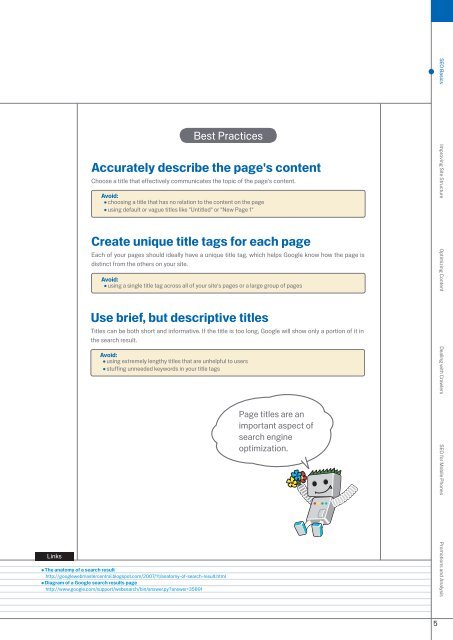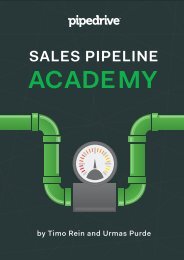Google search engine optimization starter guide
Google search engine optimization starter guide
Google search engine optimization starter guide
You also want an ePaper? Increase the reach of your titles
YUMPU automatically turns print PDFs into web optimized ePapers that Google loves.
Links<br />
The anatomy of a <strong>search</strong> result<br />
http://googlewebmastercentral.blogspot.com/ 007/11/anatomy-of-<strong>search</strong>-result.html<br />
Diagram of a <strong>Google</strong> <strong>search</strong> results page<br />
http://www.google.com/support/web<strong>search</strong>/bin/answer.py?answer= 5891<br />
Best Practices<br />
Accurately describe the page's content<br />
Choose a title that effectively communicates the topic of the page's content.<br />
Avoid:<br />
choosing a title that has no relation to the content on the page<br />
using default or vague titles like "Untitled" or "New Page 1"<br />
Create unique title tags for each page<br />
Each of your pages should ideally have a unique title tag, which helps <strong>Google</strong> know how the page is<br />
distinct from the others on your site.<br />
Avoid:<br />
using a single title tag across all of your site's pages or a large group of pages<br />
Use brief, but descriptive titles<br />
Titles can be both short and informative. If the title is too long, <strong>Google</strong> will show only a portion of it in<br />
the <strong>search</strong> result.<br />
Avoid:<br />
using extremely lengthy titles that are unhelpful to users<br />
stuffing unneeded keywords in your title tags<br />
Page titles are an<br />
important aspect of<br />
<strong>search</strong> <strong>engine</strong><br />
<strong>optimization</strong>.<br />
5<br />
SEO Basics Improving Site Structure Optimizing Content Dealing with Crawlers SEO for Mobile Phones Promotions and Analysis

















